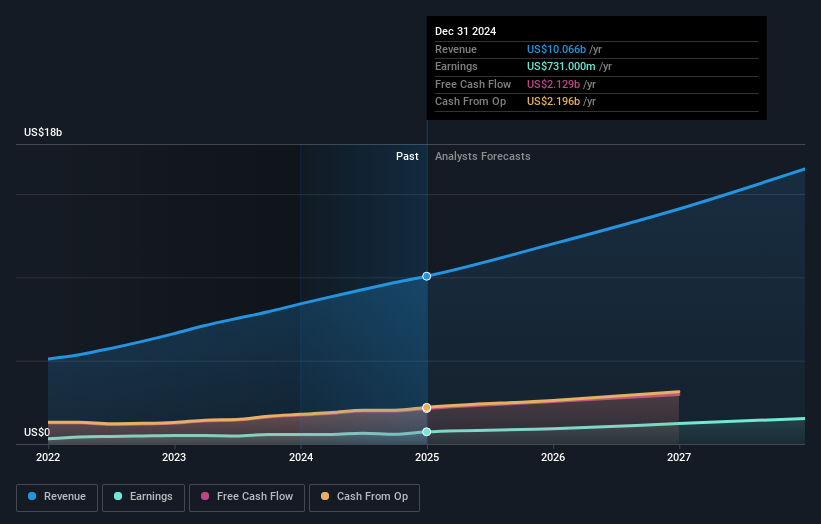Individual investors who hold 53% of Constellation Software Inc. (TSE:CSU) gained 4.2%, institutions profited as well

Key Insights
- Significant control over Constellation Software by individual investors implies that the general public has more power to influence management and governance-related decisions
- The top 25 shareholders own 36% of the company
- Insiders have been selling lately
If you want to know who really controls Constellation Software Inc. (TSE:CSU), then you'll have to look at the makeup of its share registry. The group holding the most number of shares in the company, around 53% to be precise, is individual investors. In other words, the group stands to gain the most (or lose the most) from their investment into the company.
While individual investors were the group that reaped the most benefits after last week’s 4.2% price gain, institutions also received a 40% cut.
In the chart below, we zoom in on the different ownership groups of Constellation Software.
View our latest analysis for Constellation Software

What Does The Institutional Ownership Tell Us About Constellation Software?
Institutional investors commonly compare their own returns to the returns of a commonly followed index. So they generally do consider buying larger companies that are included in the relevant benchmark index.
Constellation Software already has institutions on the share registry. Indeed, they own a respectable stake in the company. This implies the analysts working for those institutions have looked at the stock and they like it. But just like anyone else, they could be wrong. When multiple institutions own a stock, there's always a risk that they are in a 'crowded trade'. When such a trade goes wrong, multiple parties may compete to sell stock fast. This risk is higher in a company without a history of growth. You can see Constellation Software's historic earnings and revenue below, but keep in mind there's always more to the story.

We note that hedge funds don't have a meaningful investment in Constellation Software. FMR LLC is currently the company's largest shareholder with 4.7% of shares outstanding. Meanwhile, the second and third largest shareholders, hold 3.6% and 3.5%, of the shares outstanding, respectively. Furthermore, CEO Mark Leonard is the owner of 1.9% of the company's shares.
Our studies suggest that the top 25 shareholders collectively control less than half of the company's shares, meaning that the company's shares are widely disseminated and there is no dominant shareholder.
While it makes sense to study institutional ownership data for a company, it also makes sense to study analyst sentiments to know which way the wind is blowing. Quite a few analysts cover the stock, so you could look into forecast growth quite easily.
Insider Ownership Of Constellation Software
The definition of an insider can differ slightly between different countries, but members of the board of directors always count. Company management run the business, but the CEO will answer to the board, even if he or she is a member of it.
Most consider insider ownership a positive because it can indicate the board is well aligned with other shareholders. However, on some occasions too much power is concentrated within this group.
We can see that insiders own shares in Constellation Software Inc.. The insiders have a meaningful stake worth CA$6.1b. we sometimes take an interest in whether they have been buying or selling.
General Public Ownership
The general public, who are usually individual investors, hold a substantial 53% stake in Constellation Software, suggesting it is a fairly popular stock. With this amount of ownership, retail investors can collectively play a role in decisions that affect shareholder returns, such as dividend policies and the appointment of directors. They can also exercise the power to vote on acquisitions or mergers that may not improve profitability.
Next Steps:
While it is well worth considering the different groups that own a company, there are other factors that are even more important. Consider for instance, the ever-present spectre of investment risk. We've identified 2 warning signs with Constellation Software , and understanding them should be part of your investment process.
If you would prefer discover what analysts are predicting in terms of future growth, do not miss this free report on analyst forecasts .
NB: Figures in this article are calculated using data from the last twelve months, which refer to the 12-month period ending on the last date of the month the financial statement is dated. This may not be consistent with full year annual report figures.
New: AI Stock Screener & Alerts
Our new AI Stock Screener scans the market every day to uncover opportunities.
• Dividend Powerhouses (3%+ Yield)
• Undervalued Small Caps with Insider Buying
• High growth Tech and AI Companies
Or build your own from over 50 metrics.
Have feedback on this article? Concerned about the content? Get in touch with us directly. Alternatively, email editorial-team (at) simplywallst.com.
This article by Simply Wall St is general in nature. We provide commentary based on historical data and analyst forecasts only using an unbiased methodology and our articles are not intended to be financial advice. It does not constitute a recommendation to buy or sell any stock, and does not take account of your objectives, or your financial situation. We aim to bring you long-term focused analysis driven by fundamental data. Note that our analysis may not factor in the latest price-sensitive company announcements or qualitative material. Simply Wall St has no position in any stocks mentioned.
About TSX:CSU
Constellation Software
Acquires, builds, and manages vertical market software businesses to develop mission-critical software solutions for public and private sector markets.
Reasonable growth potential with proven track record.
Similar Companies
Market Insights
Community Narratives


